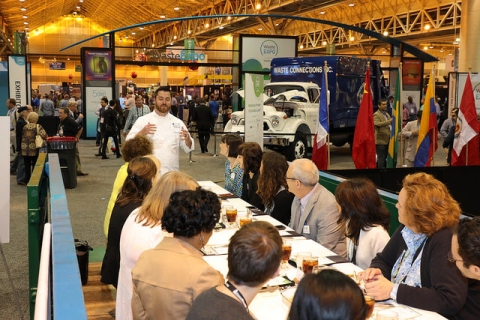Centerplate Hosts Zero Waste Lunch at WasteExpo

In the ever-evolving journey to take the trade show industry in a more sustainable direction, certain stakeholders appear to be getting creative by experimenting with fun and unique ways to cut down on the massive amounts of waste most events typically produce, including food waste.
Case in point: the Ernest N. Morial Convention Center and its exclusive food and beverage provider, Centerplate, which hosted a “Zero Waste Lunch” on May 10 at WasteExpo 2017, held May 8-11 at the New Orleans-based facility.
Created in partnership with the convention center, Centerplate, GES, Salvage Supperclub, The Green Project and The Composting Network, the uber-sustainable meal was served to 15 waste industry attendees inside a rented dumpster equipped with salvaged wood seats and flooring, and rescued doors that served as a table, all of which came from local companies.
Created by Executive Chef Brandon Felder and his team at the convention center, the delectable, NOLA-style menu was composed entirely of food waste that would otherwise have been discarded.
“The (purpose of the) lunch was to display how you can make fine dining/fancy food out of food scraps and undesirable products – in essence, transform the so-called waste into a great meal,” Felder explained.
He continued, “We basically used scraps and leftovers from other services from the show and saved onion skins, tops to bell peppers, shrimp shells, grits from breakfast, small pieces of cauliflower, pecans that were too small and started coming up with a fun, flavorful NOLA menu.”
Felder’s “Zero Waste Lunch” menu consisted of the following ingredients:
• Beet Salad: Mixed greens, goat cheese, candied pecan bits and beet puree with champagne vinaigrette. Pureed beet scraps, trimmed tops and bottoms were turned into confit. Pecan bits that would otherwise be disposed of topped the salad. Remaining champagne from Centerplate’s bars department was combined with white vinegar to create the dressing.
• Abita Amber BBQ Shrimp: Pan-seared Gulf shrimp and yellow stone-ground grits topped with grilled peppers and onions. Shrimp shells were ground down and used for stock with remaining Abita Amber Beer product, which were combined and used as the sauce. The grits were a combination of remaining yellow stone-ground grits and pureed cauliflower curd and stems (otherwise tossed pieces).
• Bananas Foster Bread Pudding: French bread, bananas and rum sauce. French bread (otherwise considered stale) was used for the bread pudding, and salvaged bananas that would otherwise be considered “too old” to sell/display were caramelized and added to the dish. The sauce was made from the rum leftover from Centerplate’s bar inventory.
According to Felder, not only did the successful culinary experiment please the select group of diners, but also his kitchen team, who enjoyed whipping up a palate-pleasing meal made from the kind of food products that would normally end up in a convention center’s compost pile, or worse – landfill.
“We had a lot of fun with this lunch, as there are not many times you get to cook for people who are sitting in a dumpster,” Felder said.
He added, “The attendees loved it. They were very impressed by how we came out of the box to make such a high-caliber lunch from potential waste.”


Add new comment